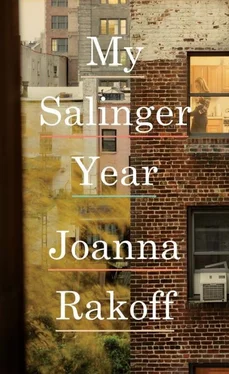I nodded. “You want me to read this?” I asked. “Now?”
He nodded. “You can take your coat off.”
The story was very short, just a few pages, and written in such dense prose that the events were not altogether clear. But the narrative appeared to concern a short, dark-haired working-class young American man involved with a tall, gorgeous Swedish woman whose pale blond hair and “perfect ass” and odd passivity drive him into a sexual rage. Panties are ripped. Otherwise, not much else happens. The story seemed to me less an actual story—with a narrative arc, and a beginning, middle, and end—than a sketch or an exercise, an exploration of this character’s mixed feelings of desire and disgust, of unworthiness and superiority. There was something about it that made me uncomfortable and it wasn’t just the sex. There seemed, within the story, an unconscious desire to punish this perfect blonde. It was a mean story.
I wasn’t sure what I’d expected from Don—Don who quoted Hegel and Kant, who loved Proust—but it certainly wasn’t this.
“Okay,” I told him warily, when I finished, and handed the thin sheaf back to him. He’d had to force himself not to stand over me as I read.
“That’s it?” he said. “Okay.” He let out a strange cackle. “Did you like it?”
I shrugged. “I guess, well, this character seems kind of like a male fantasy. The blonde with the perfect body who says, ‘Do anything you want to me.’ ”
“It’s funny you say that,” said Don, his face darkening, nostrils flaring. “It’s really funny. Because this story is completely taken from my life. That character is based on one of my girlfriends in San Francisco. Grete.”
“Greet?” I asked. This seemed a strange name, even for a Swedish girl. “Her name is Greet ?”
“Grete,” he said. “It’s a softer e sound. From the back of the throat. It’s hard to pronounce if you don’t speak Swedish.”
Don did not, to my knowledge, speak Swedish.
“He showed me a story last week,” I told Jenny. “But it was something old and not really relevant to the novel. I think his style has changed a lot since then.” For a moment, I considered my sandwich, which was chilled from the refrigerator, the bread tough and hard. “Do you show Brett your poetry?”
She started, then gave me a cold look. “No,” she said. “I don’t.” Some small—infinitely small—victory was mine, but I wished it were otherwise. “But,” she said, swallowing a bit of crust, “I’m not really writing poetry anymore.”
I nodded. I suppose I had already known.
When I returned to my desk, overpriced and unremarkable cup of coffee in hand, Hugh came by and dropped a bundle of letters in front of me. I looked at him questioningly. I was getting used to the long silences of the office.
“These are the Salinger letters,” he said.
“Oh?” I asked.
“Fan letters. To Salinger.” He sighed and shifted the bundles in his arms. “We need to answer them.”
“Okay.” I took a sip of coffee. “Does it matter what I say?”
Tersely, Hugh nodded. “There’s a form letter. Somewhere. I’ll find it.”
Hugh could, to my continual amazement, pull anything one needed from the mountain of paper on his desk. A few minutes later, he returned bearing a disintegrating sheet of the yellow paper used for carbon copies, its edges faded and frayed and soft with handling.
Dear Miss So-and-So:
Many thanks for your recent letter to J. D. Salinger. As you may know, Mr. Salinger does not wish to receive mail from his readers. Thus, we cannot pass your kind note on to him. We thank you for your interest in Mr. Salinger’s books.
Best, The Agency
The date at the top of the carbon: March 3, 1963.
“So I just send this, verbatim? I just retype it?”
Hugh nodded. “Yep. You don’t need to keep a carbon”—the Xerox machine was still new enough that many Agency employees still referred to copies as “carbons”; I loved this—“and you can toss the letters, too.”
“Really?” I asked, surprised. Nothing was tossed at the Agency. Every bit of correspondence was meticulously copied and filed. I couldn’t believe they’d throw out anything to do with Salinger, in particular. “Just put them in the garbage?”
“Yeah, we can’t keep them.” Hugh smiled a little. “They’d take up the entire office. Or, we’d need a separate archive.”
I nodded. “It’s a lot,” I admitted, gesturing toward the bundle, which still sat where Hugh had left it on the corner of my desk.
“And that’s just what came in today,” said Hugh.
I laughed. “Of course,” I said.
“No,” said Hugh. “That’s really just what came in today.”
“You’re kidding. Where’s the rest?”
Hugh resumed his habitual sigh. “In my office. Somewhere. I tried to respond to some of it back in December.”
“Does this much come in every day?” If so, I would henceforth spend my entire day, every day, retyping the letter in my hand.
“No. It ebbs and flows. We always get a lot right after the New Year.”
“Okay,” I said. “I’ll start on this right now.” I pulled the bundle toward me and began unwinding the rubber band.
“There’s no rush.” Hugh shrugged. “Just when you get to it. Maybe on Fridays, when your boss isn’t here. If you have nothing to do.” Sighing, he bent his neck awkwardly, trying to crack it. This was either a new nervous habit or one I’d not noticed before. “They’re just fans. It’s sort of the least important thing.”
“Okay,” I said again, but as soon as he returned to his office, I took the rubber band off one packet and sifted through the letters, which bore postmarks from all over the world: Sri Lanka, Malaysia, Japan, any number of Scandinavian countries, Germany, France, the Netherlands, everywhere. Quietly, I began slitting open the envelopes with my thumb, unfolding the letters inside. They were long, these letters, far longer than I expected, though what had I expected? I’d never written such a thing myself. What did I know? Some were typed on typewriters, in the style of the Agency. Some were modern missives, unfurled from laser printers on plain white paper. Many were written on stationery—pink, blue, fragile airmail, creamy white from Smythson, Hello Kitty, Snoopy, rainbows and clouds—the small, thick pages covered densely with words. One contained a friendship bracelet, woven of embroidery thread; another a photo of a small white dog. And yet another, inexplicably, some coins, taped to a sheet of ripped, dirty paper.
Over the next hour, I read and read and read, ignoring my typing and filing, impatient with the ringing phone. Many of the letters came from veterans—mostly but not entirely American—confiding in Salinger about their experiences during the war. Now, like Salinger, they were in their seventies and eighties, and they found themselves—they explained—thinking more and more about the friends who’d died in their arms, the cadaverous bodies at the death camps they’d liberated, the despair they’d felt when they returned home, the sense that no one understood what they’d undergone, no one except Salinger. Some, many, were turning to his stories again, they said, and finding that they loved them even more. They wanted Salinger to know, to understand, all this, they explained, with an urgency that made me slightly uncomfortable.
What else? Who else? There were what I came to think of as the Tragic Letters: missives from people whose loved ones had found solace in Salinger during their years-long struggles with cancer, who’d read Franny and Zooey to their dying grandfathers, who’d obsessively memorized Nine Stories in the year after losing their children or spouses or siblings. And there were the Crazies, of course, ranting about Holden Caulfield in smudged pencil, a dirty lock of hair falling out of the creased paper and onto my dark desk.
Читать дальше












